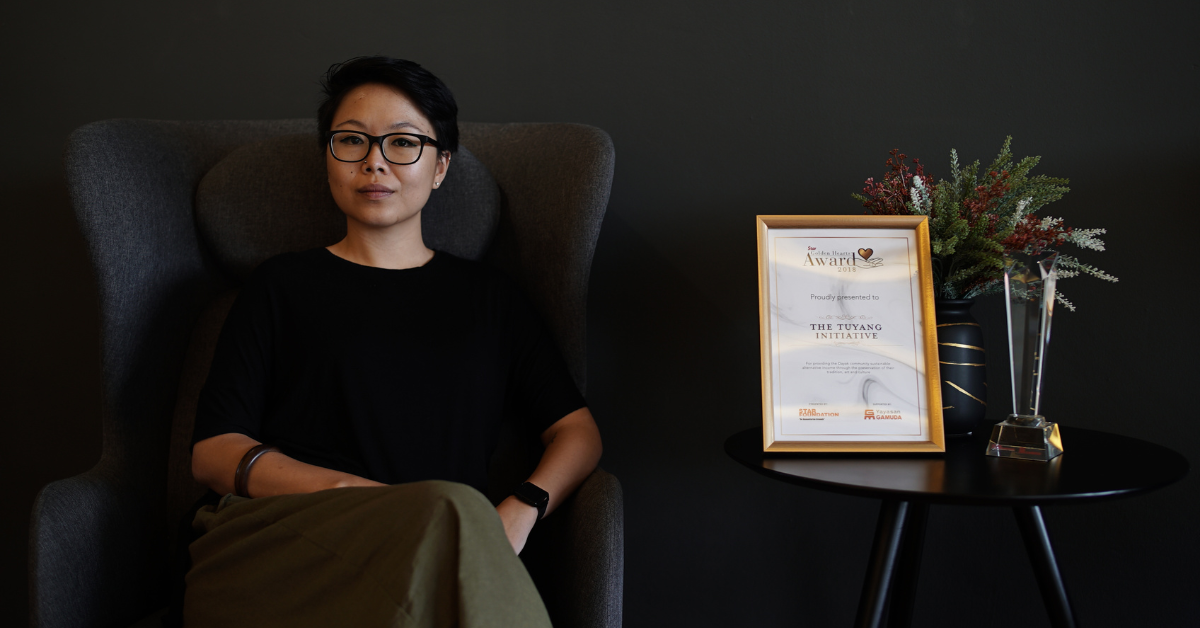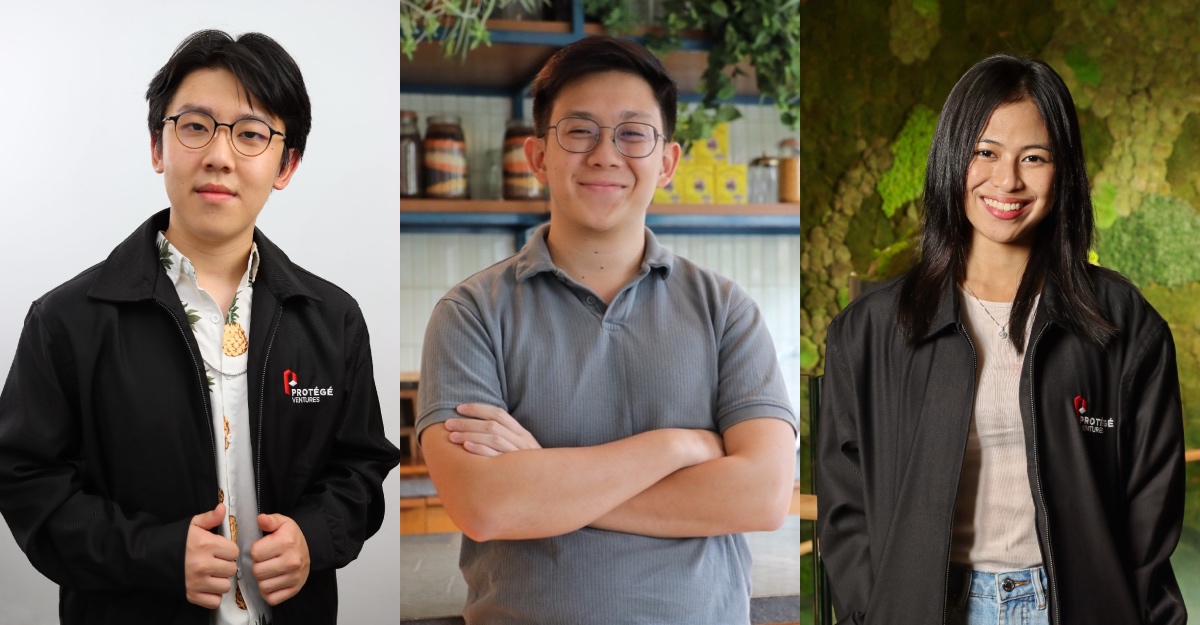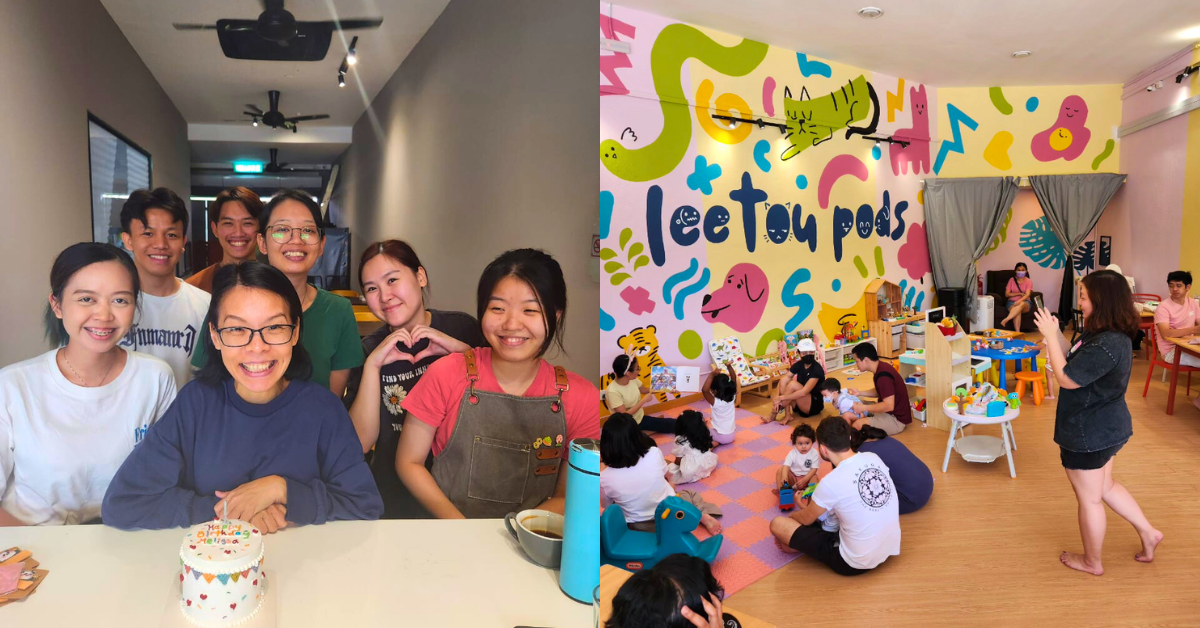The modernisation of the world has introduced many new values, ideas, and beliefs, which can be either positive or negative to the diverse indigenous cultures around the globe.
For John Wan Usang and Juvita Tatan Wan, a father-daughter duo of the Kenyah community, one of the Dayak indigenous communities of Sarawak, they felt a tremendous mismatch and disconnection from their origins after spending over a decade working away from their village of Long San, Baram.
Wanting to do something about this, John and Juvita started The Tuyang Initiative (which means “friend” in their language), an organisation devoted to the Dayak people’s cultural continuity through the performing arts.

Losing their cultural identity was a catalyst for the business
Summing up The Tuyang Initiative’s (Tuyang) mission as just being a way to enable indigenous communities to reconnect with their origins doesn’t do the social enterprise justice though.
Juvita explained that starting Tuyang was partly catalysed by her and John’s realisation that there wasn’t a meaningful way that members of their community could earn a livelihood while ensuring their culture continues.
“It seemed like something had to be given up in order for it to happen to some extent,” she lamented. “In the case of John, he had to leave the longhouse in order to get an education outside of his community, taking a corporate job in big cities, therefore raising his children away from their grandparents and cousins.”
“That in turn widens the distance of one from their culture, especially if it is so tightly-knit to the land and people,” Juvita added.
The passing of her uncle, Peter, also hit her hard. During the long travel back from KL to their rural village of Long San for his funeral, she had a lot of time to ponder about how he had lived his life.
“He was someone who taught us the ways of our people, brought us fishing, introduced us to the jungle, and more. But he was one person who, throughout his life, also felt that he hadn’t achieved enough because he was in the village.”
Not to mention, her now-widowed aunt was also worrying about what she could do with her husband no longer around, and this saddened and perplexed Juvita, who felt that she was a woman with lots of skills and knowledge.
“The culmination of all of that got me thinking if there was something that I could do to bring back pride to our different indigenous communities, celebrate our traditional way of life and the depth of knowledge that comes with it.”
Not letting systemic challenges hold them back
It’s not news that challenges such as unemployment and illiteracy are typically some of the reasons why rural communities might be seen as “not as advanced” in comparison to their urban peers.
But Juvita raises more critical questions: why do these challenges exist, and whose value system are we referring to?
In other words, why judge rural communities through the lens of what the urban populace deems as standards to live up to?
“Opportunities for income generation today can come in different forms, not necessarily in typical employment,” Juvita argued.
“From my parents’ generation, the ‘big ticket’ was employment either in the government, timber or oil and gas companies. Along the way, the price we pay is in losing our cultural values, traditions and practices, our sense of self.“
But today, she believes that the world has changed so much that opportunities for livelihood can be very different. “And that’s what we want to show our different communities with the work we do at Tuyang,” she said.
Earning a livelihood while ensuring cultural continuity
In line with Juvita’s beliefs as shared above, the organisation offers classes, workshops, and talks on the beauty of indigenous cultures, delivered by their own cultural guardians.

For example, the workshops focus on the crafting of the Sape’ (a traditional lute) and basket weaving, with the activities taking place at festivals or locations provided by partners in order to reach a larger audience.
Other services include the selling of handcrafted items, each of which has a unique story to tell. “We encourage our artisans, particularly craftsfolk to take on bespoke and confirmed projects, rather than mass producing their work,” explained the founder.
“This enables them to focus on a level of craftsmanship and hopefully bring back the joy in making their craft. That way, it translates into beautiful and high-quality crafts.”
Proof of this lies in a memory of her late grandmother beading a Saong (a large beaded sunhat) for her. “We would always see her on the balcony, chatting away while beading beautiful, intricate motifs,” Juvita shared.
“It was clearly a labour of love, not of deadline.”
Mathew Ngau Jau, who is 70 years old at the time of writing, is one of Tuyang’s own practitioners. Prior to joining the organisation, he was upset by the fact that he was not being treated fairly for his work in both performing and producing the Sape’.
“He felt that he had been taken for granted for far too long, especially because he was based in Kuching, whereas most of our practitioners are in different towns or rural areas,” said Juvita.
“Working with us, he had the opportunity to explore his various skill sets and together find exciting avenues to better share his culture and creative expression, from film to musical theater. It is something that he never imagined could happen.”

Getting the help they need
In the past, Tuyang has been financially aided by two government bodies: Malaysian Global Innovation and Creativity Centre (MaGIC) and Cultural Economy Development Agency (CENDANA).
The grants allowed the social organisation to collaborate with its practitioners and partners in the development of its products and services. By doing so, Juvita and her team are able to create opportunities for practitioners to grow their skills on the job, enhancing their services.
However, Juvita emphasised that Tuyang is a professionally operated business and not a non-profit organisation (NGO).
Thus, Tuyang does not formally accept donations. The funding from their grants usually goes to the high cost of transportation for the practitioners living in rural parts of Sarawak.
“In the context of cultural heritage, mobility is a challenge for a lot of our rural-based practitioners. [For a four-hour trip], it can cost, for example, RM500 for a return trip from Long Moh to Miri by chartered four-wheel drive,” Juvita stated.
“If we want to empower our cultural custodians, we need to look into how to better support our craftspeople who have to rely on middlemen since they cannot afford to bring their goods down, or our practitioners who just got invited for performance opportunities in the cities or overseas.”
Sharing their story with the world
Some of the team’s most memorable moments includes their 2019 collaboration on KELUNAN, where young and elderly, urban and rural practitioners were brought together to co-create a musical theatre.

“We are not theatre experts at all, so as usual, we sought out partners who were ready and willing to do this with us,” the founder affirmed. “The end product was a beautiful and honest 45-minute musical theatre that we can call ours. KELUNAN means ‘people’ in the Kenyah and Kayan languages.”
Tuyang’s performance at the opening show of the Singapore International Arts Festival (SIFA) in May 2022 was also a noteworthy achievement for the team. MEPAAN, which in Kayan means “always,” was composed in partnership with the Singapore Chinese Orchestra.
Leading the charge was Adrian Jo Milang, one of the renowned and youngest Parap and Takna’ practitioners from Tubau, who was only 21 years old when he first began training.
He now holds the role of Community Manager at Tuyang and fosters collaboration with other cultural practitioners from various indigenous tribes.

Choosing their own destiny
Juvita and her crew hope to recruit approximately ten long-term practitioners in the near future, as they are currently working primarily with three practitioners.
One of her other long-term goals would be to raise more opportunities to bring her business model to other Dayak communities across the island of Borneo and the surrounding area, so that other groups can flourish.
“We are also in the midst of developing language classes, utilising oral traditions such as poetic songs as a method to teach language,” Juvita envisions. “We feel that having context is important to understand the language and stories told.”
“We intend to deliver these classes primarily online. Perhaps an app? We’re still exploring.”
The journey of cultural preservation and awareness can be lengthy and arduous. The benefits, however, when the activity is conducted with mutual respect and understanding, can literally open up new worlds in front of us.
While Tuyang took its steps ahead in monetising its culture to sustain livelihoods, other indigenous communities in Malaysia are also encouraged to do the same in preserving hundreds of years of history and traditions.
Featured Image Credit: The Tuyang Initiative









